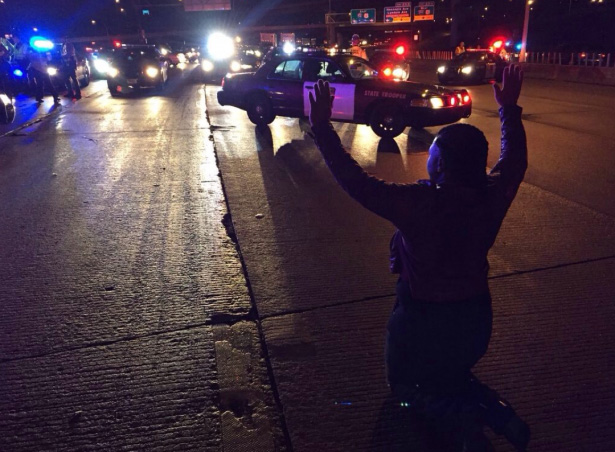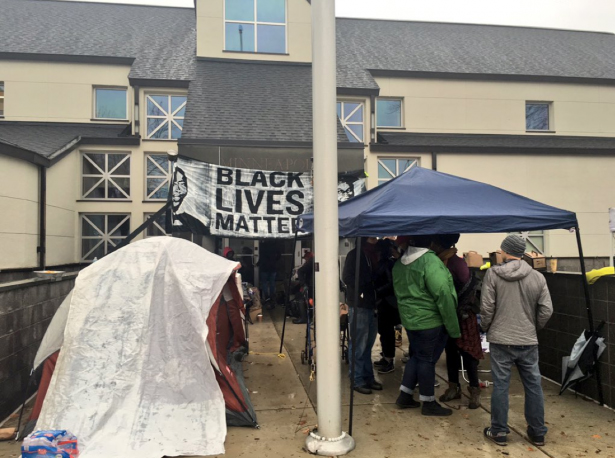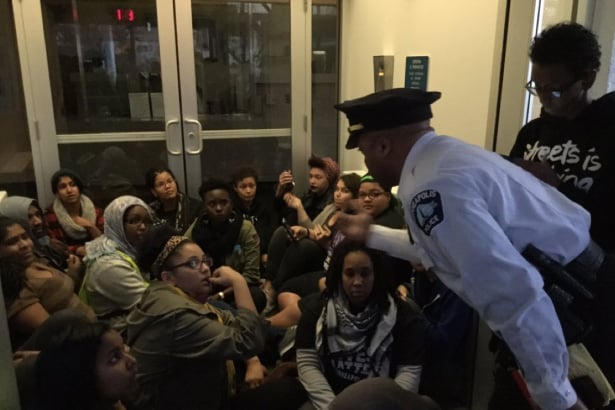
On Sunday, in the early morning hours, 24-year-old Jamar Clark was shot in the head by the Minneapolis Police Department. He passed away late Tuesday night after having been on life support since the time of the incident. Dozens of eyewitnesses recount that Clark was shot while his hands were handcuffed behind his back and he was “just laying there” – a claim police and city officials dispute. Some 12 hours after the shooting, demonstrators with Black Lives Matter Minneapolis, an affiliate of the 26-chapter Black Lives Matter network, had created a 250-person strong “no police zone” at the intersection where the shooting took place. A full day later, they were cozied up with blankets inside the North Minneapolis’s Fourth Precinct. Protesters show few signs of leaving the precinct. Meanwhile, last night, 51 were arrested while shutting down the I-94 highway.
Within Minneapolis, black residents say there has existed for decades a tale of two cities. While politicians are quick to talk about “One Minneapolis,” stark divisions remain in terms of jobs, education, housing and – of course – treatment by police. A 2015 study ranked Minnesota the country’s worst state in terms of financial inequality by race. What’s more, 62 percent of the city’s black students attend high-poverty schools, compared with just 10 percent of their white counterparts. Of Sunday’s shooting, Mayor Betsy Hodges, who is white, told local news that, “I can’t understand from my viewpoint exactly the frustration,” though her office has already been made to respond to it.
Following the afternoon demonstration on Sunday, protesters banged on the doors of the precinct, chanting “Stop killing us.” Once let inside, 30 or so demonstrators set up an occupation, and began shuttling in food and bedding from supporters on the outside. At the entrance now hangs a banner bearing the words Black Lives Matter alongside black and white portraits of Mike Brown and Eric Garner, each killed last year by police who faced no charges. Tents have been set up outside, along with a few folding chairs, and local support groups have brought everything from snacks to porta-potties. The Black Lives Matter, or BLM, network has helped to amplify news of this week’s actions in Minneapolis, and provided ongoing forums for BLM organizers around the country to workshop everything from on-the-ground strategy to navigating the legal system in the aftermath of arrests.
 Activists set up tents outside the Fourth Precinct. (Twitter / @webster)
Activists set up tents outside the Fourth Precinct. (Twitter / @webster)
In response to the protests now gaining international attention, city officials have stated that the Bureau of Criminal Apprehension will open up an investigation, and placed the two officers involved in Sunday’s shooting on paid administrative leave. Demonstrators, meanwhile, continue calling for an independent, federal investigation into the case, along with the release of police-confiscated footage from the incident captured by cameras at an Elks Lodge just across the street from where the incident took place.
Like many groups, BLM Minneapolis emerged as the wider movement for black lives exploded into headlines last year. In a phone interview from the scene of the sit-in, BLM Minneapolis organizer Michael McDowell told me that the movement, locally and nationally, “is providing the space for people to be unapologetically themselves.” The last few months, the group has been working to further involve community members in their strategizing and decision-making processes, as well as create opportunities to mobilize more broadly around the forces impacting black, Latino and indigenous city residents.
McDowell noted that local organizing around racial justice has provided a common gathering place for communities that are typically divided to come together around shared values, and an opposition to white supremacy. “Black Lives Matter is really breaking down those barriers between communities that have been set up intentionally,” he said. BLM Minneapolis’ full list of demands around Clark’s shooting include community oversight over police with full disciplinary power, media coverage of eye-witness testimony, and for police officers to live in the communities they serve.
 Activists are camped the North Minneapolis’s Fourth Precinct. (Twitter / @BLongStPaul)
Activists are camped the North Minneapolis’s Fourth Precinct. (Twitter / @BLongStPaul)
“Even now,” McDowell said, “people are asking ‘How can we escalate more? What’s our next move if they don’t meet our demands?”
In the early morning on Monday, protesters were gathered at the site of the incident, singing in front of a few bewildered local news crews. Being careful to respond to the needs of grieving families like Clark’s, McDowell emphasized the importance of creating outlets for healing and creative expression in the face of tragedy.
“There are moments when we do need to be solemn, and we do need to have a stand-off with the police,” he said. “And there are moments when we need to be dancing in the streets.”
Speaking against the authoritarian crackdown
In the midst of a nationwide attack on civil liberties, Truthout urgently needs your help.
Journalism is a critical tool in the fight against Trump and his extremist agenda. The right wing knows this — that’s why they’ve taken over many legacy media publications.
But we won’t let truth be replaced by propaganda. As the Trump administration works to silence dissent, please support nonprofit independent journalism. Truthout is almost entirely funded by individual giving, so a one-time or monthly donation goes a long way. Click below to sustain our work.